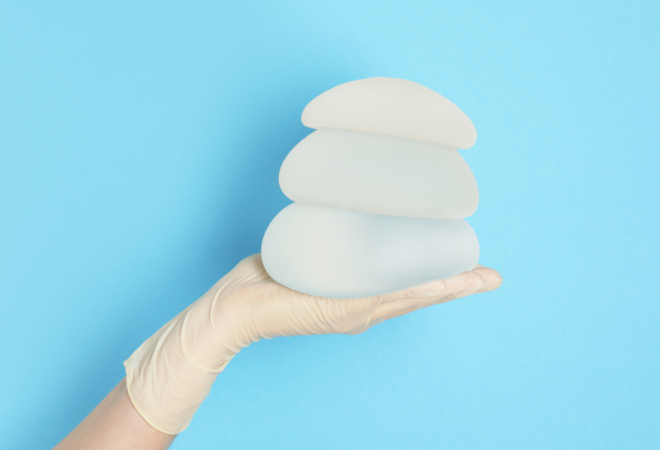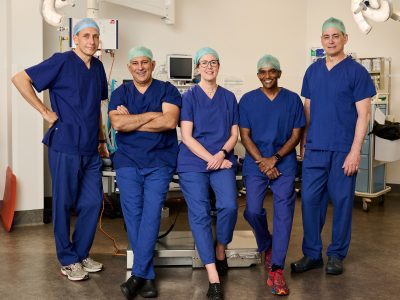An update on the safety of breast implants was reported in the media in early 2019, including the proposed cancellation or suspension of certain textured breast devices. These reports related to a rare incidence of Breast Implant Associated-Anaplastic Large Cell Lymphoma (BIA-ALCL). It is important to note that BIA-ALCL is not a form of breast cancer.
You can be assured that our Specialist Plastic Surgeons are aware of this issue and the risks of BIA-ALCL forms an important part of discussions our surgeons conduct with every prospective breast augmentation patient at the Western Australian Plastic Surgery Centre.
If you are concerned about your breast implants, particularly swelling or hardening, please seek medical advice promptly from your GP or if you had your surgery with us, please book an appointment with your surgeon. We will provide you with a request form to have an ultrasound of your breasts prior to the appointment to investigate the cause of any issue, which in most cases will not be related to BIA-ALCL.
The Facts
- Breast Implant Associated-Anaplastic Large Cell Lymphoma (BIA-ALCL) is a rare form of Non-Hodgkins Lymphoma of the breast in women with breast implants. It is associated with textured or polyurethane breast implants, bacteria, time and there appear to be genetic factors as well putting some at greater risk.
- The risk of any lymphoma in an Australian woman living to the age of 85 is 1:50.
- BIA-ALCL is a rare disease. Of the estimated 35 million women around the world with textured or polyurethane breast implants there were less than 1,000 confirmed cases worldwide by end of October 2019, with 104 confirmed reports to the Therapeutic Goods Administration in Australia. The most accurate data at present suggests that risk of this lymphoma was varied between 1:1,000 to 1:10,000 depending upon the type of textured surface.
- Smooth breast implants on their own have not been associated with this disease.
- There is also published evidence that suggests applying bacterial mitigation strategies at the time of surgery in the form of the 14-Point-Plan reduces the incidence of this disease.
- BIA-ALCL usually presents with delayed swelling of the affected breast or less frequently with a lump (or both) for no apparent reason from generally three to 14 years after the original implant surgery (average eight years). However, most delayed breast swelling after breast implants are not going to be BIA-ALCL.
- As with all cancers there are those who present in an early stage and those who present with more advanced disease. The disease has an indolent/slow course with most women diagnosed and treated in an early stage (>85%) with symptoms for eight months on average. At this stage the disease is cured with surgery alone without the need for chemotherapy, radiotherapy and with no recurrence when performed properly. To date, all patients with early stage disease who receive appropriate treatment are cured with surgery alone.
- In contrast, patients who present with more advanced stage disease (<15%) have had symptoms on average for 22 months (almost two years) before definitive treatment. If symptoms are not investigated and left untreated the likelihood of more advanced disease increases as with other cancers.
Therapeutic Goods Administration Review on Breast Implants
Despite overseas bans on six manufacturers of heavily textured (known as macrotextured) and polyurethane implants earlier in 2019, the Therapeutic Goods Administration (TGA) in Australia opted not to issue an outright ban, but rather they requested all Australian textured implant suppliers to provide detailed information and samples of their implants for analysis.
In October 2019, the TGA completed its extensive review and laboratory assessment of textured breast implants available in Australia. The TGA has opted to suspend multiple macrotextured breast implants and tissue expanders however, our surgeons do not use any of these suspended devices.
The TGA has advised Australian suppliers of the microtextured breast implants devices our surgeons use that there will be no suspension.
To ensure the highest level of patient safety possible though, the TGA has imposed ‘conditions’ on all breast implant devices that remain available in Australia, including ongoing monitoring of BIA-ALCL, six monthly reporting to the TGA, as well as updated information to be provided to surgeons and patients.
Because BIA-ALCL is rare, experts and the TGA have advised that patients who currently have textured implants do not need to have them removed if there are no presenting problems with the implants.
Our surgeons at the Western Australian Plastic Surgery Centre use smooth or microtextured implants and tissue expanders from the world’s leading implant manufacturers – primarily Mentor, which is owned by Johnson and Johnson. Mentor implants are backed by a 10 year guarantee, have a demonstrated safety record, and have been shown in the ALCL research to have amongst the lowest rates of implant-related complications at less than 1 in 36,000 risk for microtextured implants.
We do not use macrotextured implants that have been known to have a higher rate of implant-related complications at 1 in 2,000 risk.
We do not use the macrotextured Silimed or Allergan implants that have been featured in the media as being of higher risk and have been subject to bans overseas. A small number of these implants were chosen for selected patients prior to 2016. If you are concerned, please contact us and we can confirm your implant type.
Is breast implant illness the same as BIA-ALCL?
Breast implant illness (BII) is an unclear capture-all term used by patients to describe any infliction caused by breast implants and quite often the media feature reports of various illnesses that women with implants have attributed to those implants.
Whilst there are scientifically validated and well-documented issues associated with breast implants – such as capsular contracture, migration, implant rupture and even the rare association between textured breast implants and BIA-ALCL – there is little evidence to show implants cause other unexplained and debilitating symptoms like auto-immune diseases, allergies, migraines, fatigue, joint pain, etc that patients may associate as BII.
Breast implants are medical devices and some patients just do not co-exist comfortably with their implants. As highlighted in the Sydney Morning Herald, sadly some doctors are taking advantage of patients who believe they have BII and offering them (at a large cost) to have their implants removed with no guarantee it will resolve their symptoms.
If you are experiencing any health issues, you should seek medical advice from your GP or surgeon before making any decision to remove your implants.
You can find more information about BII from the Australasian Society of Aesthetic Plastic Surgeons (ASAPS) here. You can also read a statement on breast implant safety from the Australian Society of Plastic Surgeons (ASPS) here.
Additional Information
Our surgeons are members of the Australian Society of Plastic Surgeons (ASPS) and you can read their update on breast implant information here.
The Australasian Society of Aesthetic Plastic Surgeons (ASAPS) is one of the peak bodies for cosmetic surgery in Australia and you can read their update here.
Additional information is available from the Australian Government’s Therapeutic Goods Administration, who regularly review this issue.
Return to News & Surgeon Blog



